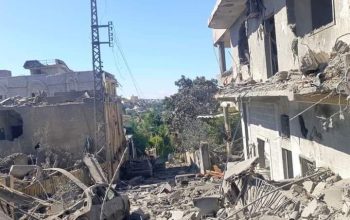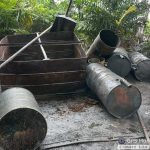The Minister of Interior, Rauf Aregbesola has said that, atrocities against Nigeria citizens should not be forgotten or swept under the carpet, but be matted with strict sanctions regardless of who they are.
Aregbesola made this known during a two day summit on enhancing collective memories to mass atrocities prevention, organized by Global Rights on Tuesday in Abuja.
Represented by the Deputy Commandant, Nigeria Security and Civil Defence Corp. NSCDC, who also doubles as Technical Adviser to the Minister, Ibiloye Oluyemi, said, the mass Atrocities are against civilians as well as security agents in Nigeria, from the raveging Boko Haram terrorists in the Northeast, the activities of Bandits in the North Central and confrontations between herders and farmers across the country that have kept the number of casualties growing by the day.
While noting that a quite number of children being orphaned, women being widowed and citizens rendered homeless amongst other atrocities by state and non state actors, the Minister however expressed confidence that the summit will emphasize the importance of responding to threats against Nigerians and the necessity of doing everything possible to prevent violence from happening in the first place.
“You will agree with me that globally there are elvolving security issues, and Nigeria is not an exception, the nation is currently grappling with myriads of security challenges ranging from terrorism, Banditry and kidnapping, farmers/herders conflict which has given many causes for concern.
“It is therefore imperative for us all to out offorts in place like the Final Rights organization is doing, to invest in the human rights in Nigeria and especially women and children, it is also imperative that the country is tired with best practices to straighten the security of our of country to ensure that trust and improved security is re- instated”. He said.
In his keynote address, the Executive Secretary, National Human Commission, Tony Ojukwu, SAN who was represented by one of his staff at the Commission, Halilu Adamu, noted that task of nation building is always challenging and requires conscious efforts of all stakeholders including the political class, pressure groups such as traditional rulers, professional associations, trade unions, captains of industries and Civil society.
According to him, Nigeria has a chequered history of conflicts emanating from struggles for political power and economic resources accros ethnic cleavages and religious Creed’s.
“These conflicts have increased in mass atrocities where millions of lives were lost, hundreds of properties were destroyed and means of livelhoods were completely jeopardize.
“There have been some attempt to document these crises such as the settings up of judicial and administrative commissions of enquires to examine the remote and immediate causes of these crises and to proffer suggestions to prevent re-occurrence”.
On his part, Director General, National Orientation Agency, Dr. Garba Abari, said that the surge in atrocities across the country and it’s negetive impact on national development cannot be over emphasized.
The NOA Boss was represented by Director, Orientation and Behavioural Modifications, Barr. Mrs. Tessy Nnalue noted that, the negetive impact of these atrocities in the societies cannot also be overlooked, as according to her, economic activities like shopping and business activities, growths in local income and GDP, poverty, and other related social factors such as the availability of labor, access to services, and the ability and willingness of individuals to partake in leisurely activities which directly affect the tourist sector has grossly been affected negatively.
“The NOA as part of it’s mandate of promoting peace and harmony within the Nigerian society is always ready to partner with relevant organizations and stakeholders to bring about desire positive change in all spheres of our national life as citizens of this great nation.
“We apploud Global Rights for the summit,bit is our view that it will serve as a melting pot for implementable ideas towards Attaining the objective of bringing to an end these atrocities plauging our country”. He said.
Earlier in her welcome Address, Executive Director, Gobal Rights, Ms. Abiodun Baiyewu noted that, the trauma of mass atrocities is a recurrent decimal in Nigeria, from its precolonial era to independence, to the torturous years of military rule, and now.
According to her, from violence acquiesced by the state, to state sponsored violence, the country threshold for violence and acceptance of impunity has exponentially grown, so that even now, 23 years into its democratic renaissance, Nigeria have become an unfortunate standing theatre for mass atrocities.
He explained that for decades, Nigerians bore with ignominy, the various atrocities of the colonial government.
She said “years into our independence, we were confronted with a bloody coup which
precipitated an ethnic pogrom. And then 3 years later, its impunity led to a civil war that resulted in a carnage yet to be equaled in brutality.
“Needless to remind you, the atrocities of the civil war are yet to be addressed. From then on we trudged on as a nation, leaving a trail of human blood in periodic episodes of violence. From religious to communal, ethnic, to government repression, to violent extremism, to cult clashes, to electoral violence… with each disappearance, each forced eviction, each arbitrary detention, each arson, each torture, each killing, it appears that our national conscience has grown dimmer, and our cry for justice- less audible. Our actions have been deliberately amnesic. Amnesia however will never resolve issues”
she added that Nigeria post traumatic disorder manifested through its manifold crises, bear witness to this. She said that since 2010, Nigeria seem to have turned a precarious curve the numbers of victims
from each year has exceeded the last in it’s rapidly metastasizing scope and nature of violence.
“Mob killings, herdsmen attacks, banditry, terrorist, secessionist related massacres, targeted killing of security personnel, communal attacks, pillages, extra-judicial killings, kidnappings, sextortion, ritual killings, politically motivated assassinations, security forces’ brutality, forced disappearances, arbitrary arrests, and an endless list of horrors, each worse than the last and for which there has hardly been any redress”. She added.
According to her, since 2015, the killings in the Middle Belt have escalated to a point where, by 2016, more people were being killed in the conflict in the region than in the conflict over Boko Haram. In 2018, over 2,000 people were killed in the Middle
Belt alone, more than double the number that were killed in all of 2017.
In North-West Nigeria, she said a crisis of governance has now snowballed into mass atrocities attributed in the narrative of government to people described as
“bandits” and “cattle rustlers”. In Zamfara State alone, for instance, over 10,000
have been killed by these bandits since 2017.
“The State Government has confessed to being incapable of managing the situation. In 2017, the Zamfara State government resorted to an arms amnesty as its way of managing this situation. One bandit alone known as Buharin Daji (Buhari of the Forest), reportedly received N350,000 for each assault rifle he surrendered.
Considering that he surrendered 9,250, a sum of about N3.24 billion. Far from diminishing mass atrocities, these kinds of measures have made violence and mass killings so attractive, that by 2021, the entire region had combusted into the daily mixcrises of pillage, kidnappings and terror attacks.
“Nigeria’s elections are not any less violent and are one of the most violent in the
world. Our collective psyche have been so raped that we often do not remember to keep figures on the injured, only the dead. Worse still, 23 years into our democracy, we have come to expect these killings and arsons, and militarize our elections accordingly.
“The mass killings are not just perpetrated by non-state actors. How history attest
to massacres perpetuated by the state: Odi, Zakin Biam,Ugep, Apo, Rivers, the
shittes Kaduna and more recently the Lekki end of Ozumba Mbadiwe.
“In nearly all these situations, victims have not been properly identified or documented, patterns of violations have also been poorly investigated.
A death of forensic capabilities coupled with clear evidence of a lack of will in government has resulted in a chronic absence of accountability”. He said.








